
11 minute read
Prep for Life
TASK AND LEAD PROGRAMS ARE REQUIRED COURSES for High School students at Marburn. These courses support executive function and life skills inside and outside of the school. From learning to balance a checkbook to planning for the ACT, students are introduced to tools and strategies that are designed to benefit them for life.
TASK: TRANSITION AND APPLICATION OF STUDENT SKILLS
TASK is a course for direct instruction in executive functioning skills. Students learn about the resources available to them to support their individual executive function needs. Students are also exposed to and encouraged to explore different types of post-secondary and career options.
In this course, students: u Create a four-year plan for a successful high school career and build college readiness skills u Develop research, writing, and presentation skills through a variety of activities
TASK 1 curriculum includes study skills, note-taking, test-taking, public speaking, goal setting, tips for success, organizational skills and projects, time management, financial literacy, and college/career exploration. TASK 2 curriculum builds on the learning gained in the TASK 1 course and adds lessons on multiple intelligences, financial responsibility, public speaking, and self-awareness. To ensure success in both courses, students are provided with opportunities to work independently, with partners, and in teacher-led collaborative groups.
LEAD: LEADERSHIP, EXPERIENCE AND APPRENTICESHIP DESIGN
Junior LEAD focuses on strengthening students’ self-understanding and using strategies to help manage more challenging coursework.
In this course, students: u Learn about financial literacy through observing the stock market, identify personal wealth tools, and gain proficiency in how the federal income tax process works u Evaluate the college search process by learning about financial aid, researching post-secondary options, staging a formal interview, analyzing Common App essays, and presenting research findings u Study for the PSAT and ACT
Highlights from the 2019-2020 school year included: a class visit to the University of Cincinnati, watching a group of students take a virtual $1MM and turn it into a virtual $18MM through a simulated stock market exercise, and the writing of amazing narratives crafted by students to share the many facets of the young adults they are growing up to be.
Senior LEAD, also known as LEAD 2, is the final course in the Marburn
Mrs. Dunlevy works with 9th and 10th grade students during a LEAD class on understanding finances, balancing a checkbook, and calculating credit card interest.
TASK/LEAD program. The course focuses on practical life skills development, in conjunction with the college admissions/post-secondary options process, with the goal of preparing students for a successful life after Marburn.
In this course, students: u Identify interpersonal skills through the study of What Color is Your Parachute? For Teens, a book designed to help high
u school and college students zero in on aptitude and skills to find their perfect major or career Cultivate skills related to the requirements for post-secondary education planning, including Common App completion, recommendation letters, resume writing, communication skills (conflict management with roommates, speaking with professors and supervisors, interviewing, etc.), and senior speeches
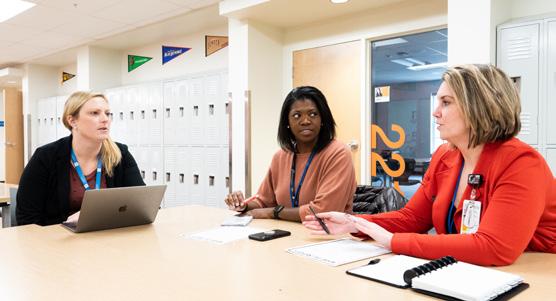
Through Nationwide Children’s Hospital’s (NCH) mentoring partnership with Columbus City Schools, NCH staff is evaluating ways to support students in managing executive functions—mental skills that include working memory, flexible thinking, and self control. Their visit to Marburn’s TASK class provided the opportunity for them to observe how Marburn helps students overcome their own executive function challenges. “Seeing the TASK class in action was a great experience that provided insight into ways to strengthen relationships and ensure productive student-mentoring sessions through my organization’s mentoring program,” said Katie Higgins of the Community Wellness Division at
Develop awareness of the components of financial literacy, including the difference between scholarships and student loans, budgeting as a college student, understanding credit and debt, taxes, being an informed consumer, and financial pitfalls Put “theory into practice” as it relates to general life skills including the mind-body connection, soft skills, social-emotional needs, and other basics
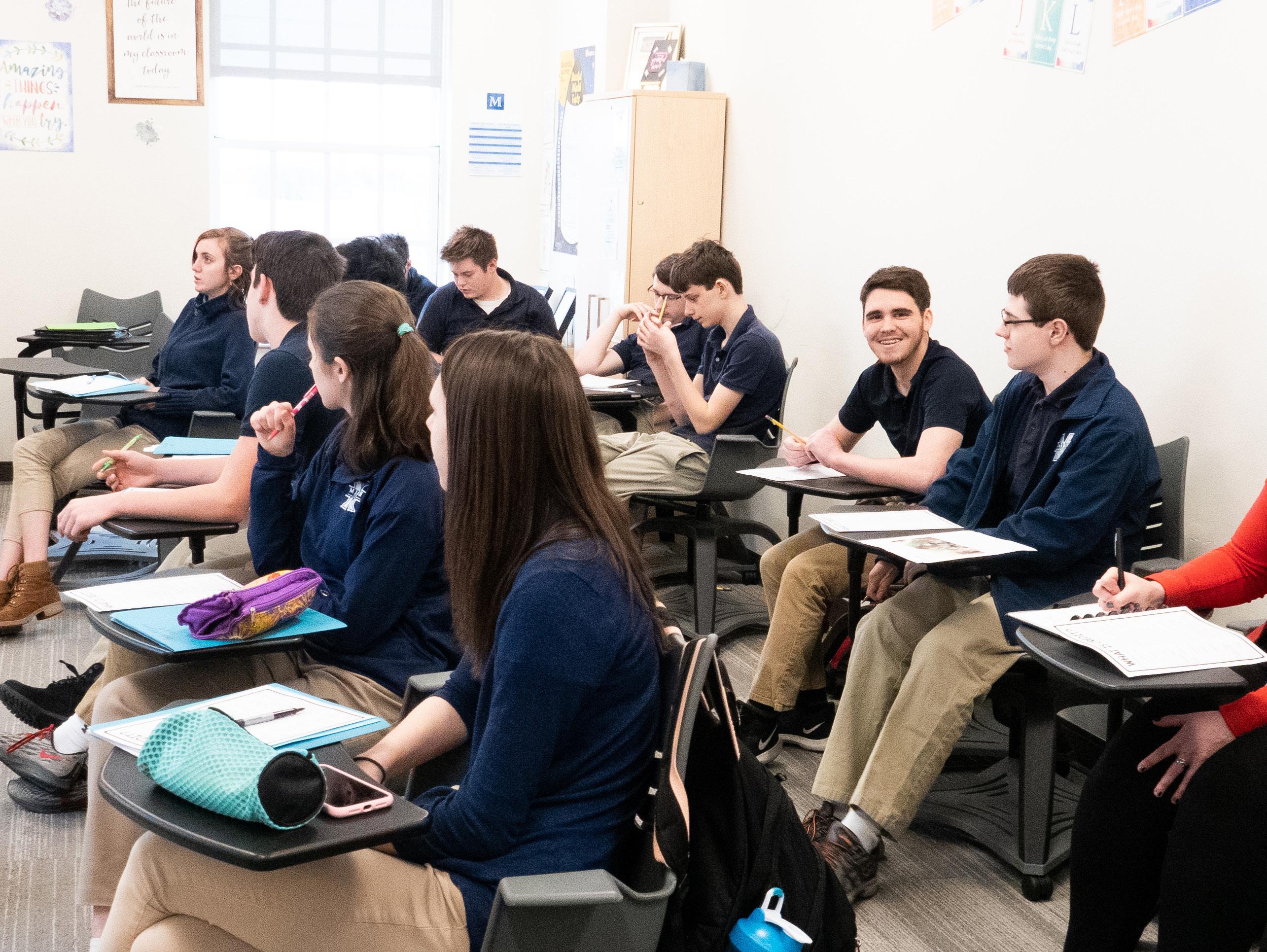
(laundry, changing a tire, renting an apartment, and leasing versus buying a car, etc.)
For the 2020-2021 school year, the TASK and LEAD curriculum has transitioned to students’ advisory periods.
Mrs. Rubin grades presentation assignments about college expenses for 11th grade students in LEAD class..
Nationwide Children’s Hospital. “In my first session after observing the class, I was able to use several of the redirects that were modeled by Marburn’s TASK teacher. As a result, I was able to have a direct conversation with a student about the impact of executive function skills on her success during our mentoring session and on her general success in school each day.”
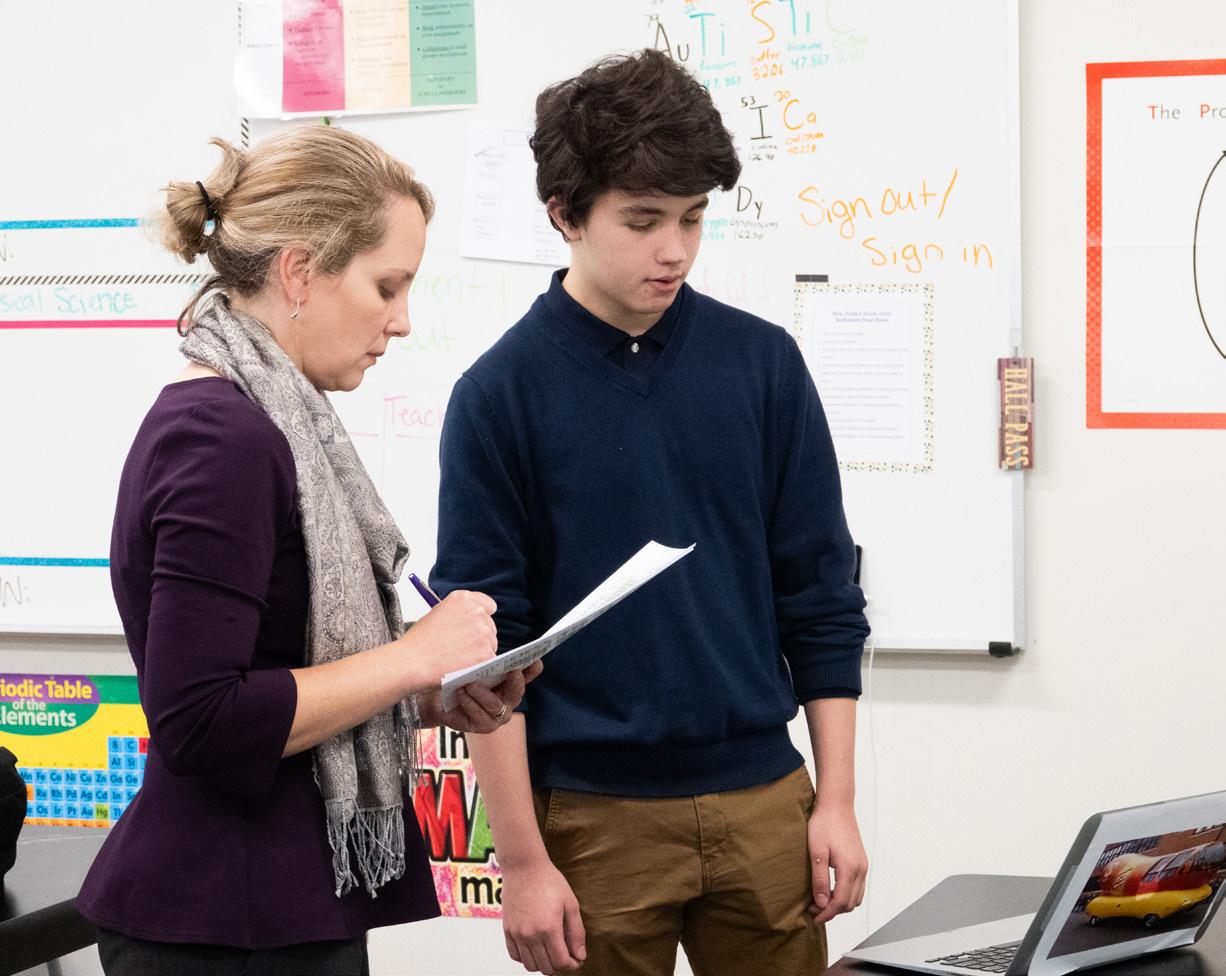
LEGACY
LIVING A LIFE THAT LASTS
EARL OREMUS
In January 2020, Marburn Academy and the greater community lost a leader. A difference maker. A soldier for underserved students.
Earl B. Oremus was the Head of School at Marburn Academy from 1988–2015. In his time at Marburn, he oversaw enrollment grow by 229 percent, he was instrumental in helping to raise more than $9MM to help support student scholarships, and he made a profound imprint on countless students, teachers, and staff.
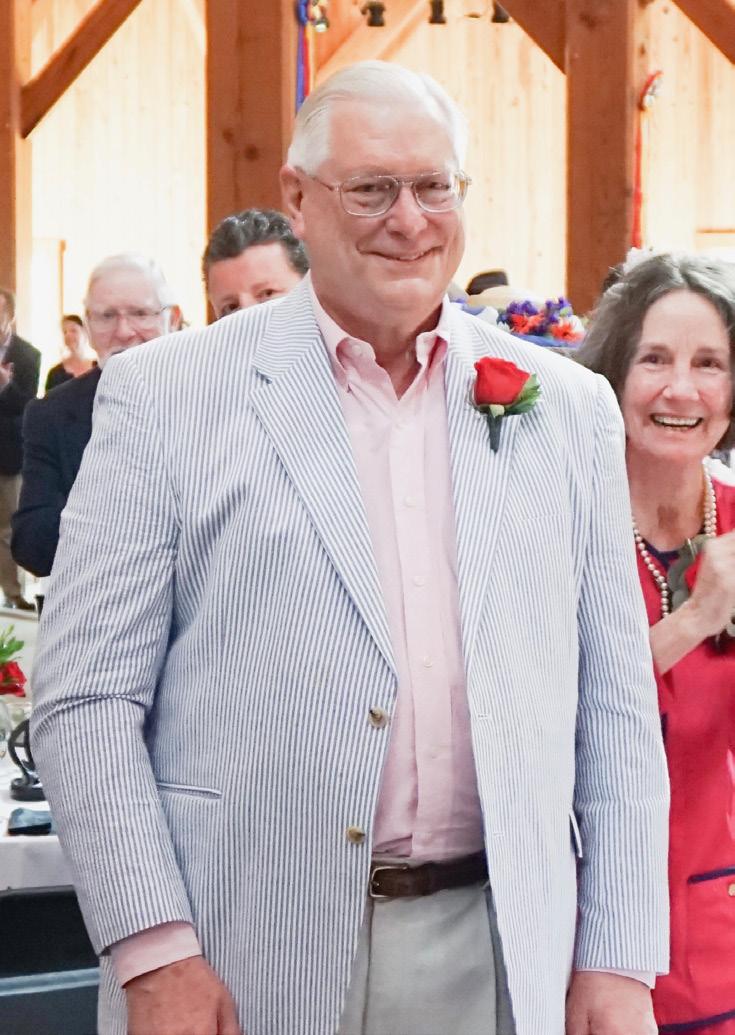
By working with legislators and numerous non-profit organizations, “Mr. O,” as students fondly called him, advocated for the educational needs of students who learn differently even into retirement.
But Earl was more than that. He was a husband, father, grandfather and friend to everyone he met. His tall stature demanded presence, his booming voice could be heard down the long corridors of the school, and his boisterous laughter was infectious.
Godspeed, Earl. You will be missed and your impact will live on for years to come.
EARL OREMUS INSPIRATION FUND
Knowing the great love that Mr. O had for Marburn and its students, his family chose to continue his legacy by starting the “Earl Oremus Inspiration Fund.” The named endowment will be used to help future generations of students who learn differently. If you would like to make a gift to the “Earl Oremus Inspiration Fund”, please scan the QR code or visit our website at MarburnAcademy.org.
JON PETERSON
In October 2019, our community also mourned the loss of an instrumental individual who left an impact on the Marburn Community; an individual whose work benefits approximately 95 percent of our families every year.
Those 95 percent receive the Jon Peterson Special Needs Scholarship, a program funded through the Ohio Department of Education that provides scholarships to K-12 students who have an Individualized Education Program (IEP) from their home district.
As a parent of a child who learns differently, Jon was passionate about education. His work provides families the funding needed to afford Marburn Academy tuition and supports students on their educational journey. Since the program launched in 2012, Marburn families have received nearly $15 million in aid through the Jon Peterson Special Needs Scholarship Program.
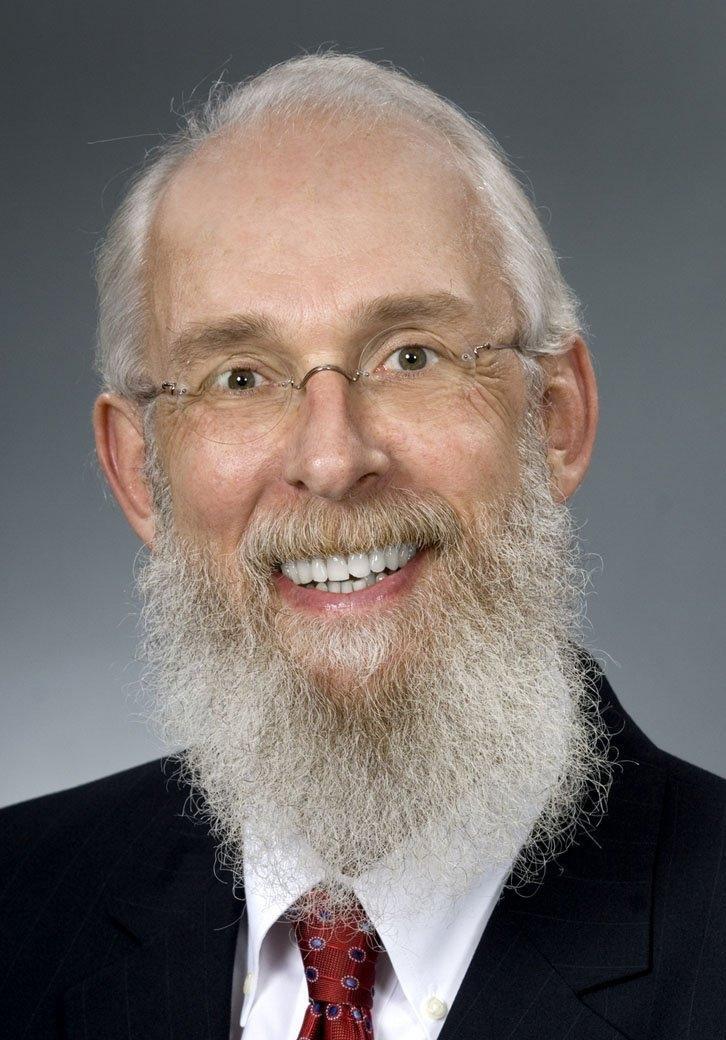
Although most of our families never met Jon, his passing was felt by the entire Marburn community. His legacy will be the many students, from Marburn and around the state of Ohio, who are able to use these funds to seek out an education that best fits their unique needs.
Passing
THE TORCH
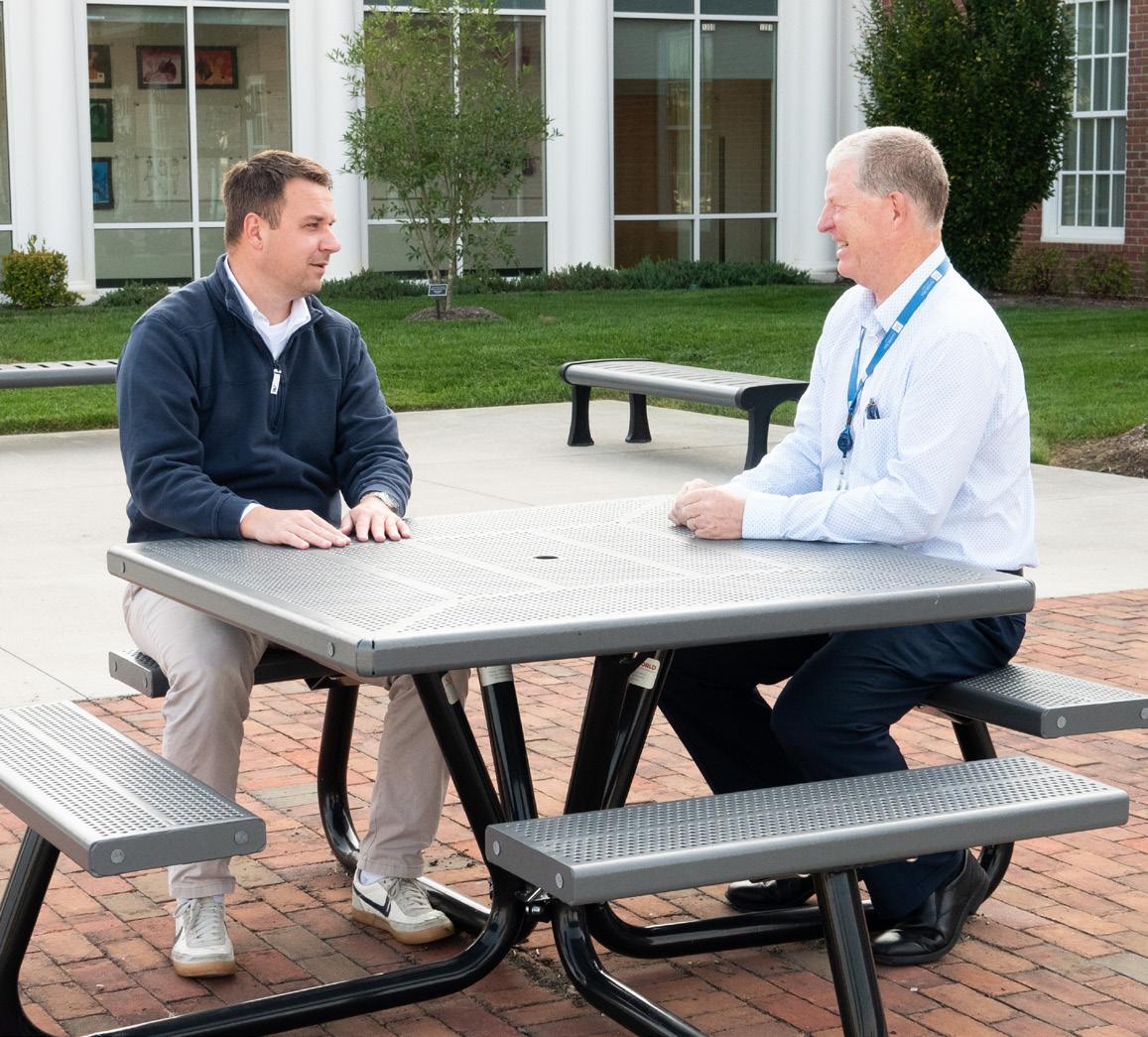
On July 1, 2020, Eldrich A. Carr, III became Marburn Academy’s sixth Head of School, succeeding interim Head of School, Scott Burton, who held the role during the 2019-2020 school year. Mr. Burton served as interim Head following a 35-year teaching and administrative career at Marburn, while Mr. Carr takes the helm after serving as the Principal at Springer School and Center in Cincinnati. Here, the two Heads converge for a conversation about leading the Marburn Community, building traditions with students, and tips for pulling out a win during the annual faculty and staff dodgeball game.
Eldrich to Scott: What advice can you give to me as the new Head of School?
Scott: The biggest piece of advice I can share is that, in the Head of School role, it’s all about relationships. Developing relationships with students, families, faculty, staff, and board members is so important. They become your support group and the ones you can run things by. Solid relationships are critical for decision- making and for creating a culture of trust and positivity.
Eldrich: I plan on relying on the “veterans” of Marburn in order to gain a better understanding of institutional history. Not that one would be beholden to the past, but the rich history does help to inform decision-making for the future of the organization.
Eldrich: What did you find most surprising about the Head of School role?
Scott: Getting pulled in so many directions at one time. The constant shifting of gears—from student issues, board functions, fundraising, outreach—there is a lot in motion at all times. I had to have a pulse on every aspect of the community and an understanding of the many moving pieces. After 35 years in various roles at Marburn, I thought I knew all of the details. I was surprised— but proud—of the tremendous amount of work happening in every area of the school.
for you in your time as Head of School?
Eldrich: I suppose the surprise is that there hasn’t been a bad surprise yet! All of my expectations have been met and then some. Everyone knows their role and responsibilities; everyone has significant buy-in to the mission and the culture is strong. The COVID-19 crisis is highlighting all of Marburn’s many strengths and speaks to how good Marburn has been for such a long time. A great example of this is with current enrollment. It speaks volumes that so many families are willing to stick with us even during such uncertain times. The success of the past year is really a reflection of all the hard work and effort of the past several years.
Eldrich: What helped you navigate the ins and outs of so many areas of the school?
Scott: I will bring it back to relationships. I came into the interim role at an advantage because I knew the faculty and staff well and could trust them in their roles. The teams we have in place currently are extremely mission-driven and professional and that makes all the difference in the world. I knew I could rely on the team.
Eldrich: I have certainly been impressed by the team thus far. In any leadership role, there has to be a level of humility. One cannot always have all the answers. I am doing a lot of listening and learning. I think it’s important to have patience and to develop strategies methodically.
Eldrich: What has been your favorite tradition that you are excited for me to experience?
Scott: Thanksgiving is a really special time at Marburn. All of the students, faculty, and staff gather for a meal and participate in service projects, and we invite alumni to participate, too. I love seeing our alumni come back and interact with their former teachers. It’s gratifying to see the connection students and teachers still have with one another. I also love the new tradition of the basketball game and pep rally—you should start practicing now because the faculty and staff take on our Panther basketball team. It’s always a shootout!
Eldrich: I’ve heard about some other really great traditions that exist at Marburn. One being the annual faculty and staff dodgeball game. What advice would you give to help me win?
Scott: Haha! The faculty cheat! In all seriousness, whether it’s the faculty dodgeball game, or other downtime, it’s important to let your guard down and have fun on occasion to really get to know the community on a personal level, while at the same time understanding when it is time to be professional. It’s a balance.
Eldrich: If you could sum up words of advice to hold on to, what would they be?
Scott: Two things, especially during the first year as the Head of School: 1.) To listen and 2.) To be observant.
Eldrich: What do you love most about Marburn?
Scott: That’s pretty easy. First, it’s the kids. They’re the reason we are all here; our why. They’re why our teachers stay for a long time. Second, I love our faculty and staff. I am really proud of the work that we have done as a team to advance Marburn’s mission, both in the classroom and in the community.
Scott: What drew you to Marburn?
Eldrich: I have always been aware of the good work that happens at Marburn. What really drew me to this position, though, was the people that make up the community. Every person I met throughout the process—families, staff, board members—I was impressed by all. I was blown away by the culture and the progressive nature of the organization. Marburn has roots, but it’s also ambitious.
Scott: What are you looking forward to in your first year as Head?
Eldrich: Getting to know the kids and families. The students are the crux of where I get my energy and where I find joy. I pursued a career in education because I am passionate about helping children. I am driven by the need to make an impact on students and families who need strong advocates and voices. I’m excited for the opportunity to build upon the strong foundation that Marburn has laid. We have folks like you, Scott, to thank for that.










